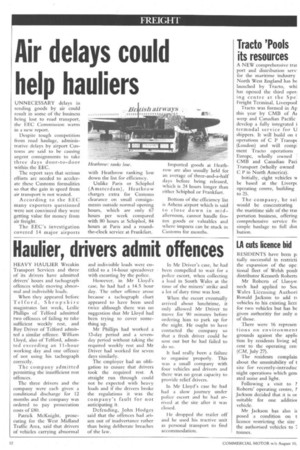Haulier, drivers admit offences
Page 14

If you've noticed an error in this article please click here to report it so we can fix it.
HEAVY HAULIER Wreakin Transport Services and three of its drivers have admitted drivers' hours and tachograph offences while moving abnormal and indivisible loads.
When they appeared before Telford, Shropshire magistrates last week, Leslie Phillips of Telford admitted two offences of failing to take sufficient weekly rest, and Roy Driver of Telford admitted a similar offence. William Lloyd, also of Telford, admitted exceeding an 11-hour working day and one offence of not using his tachograph correctly.
The company admitted permitting the insufficient rest offences.
The three drivers and the company were each given a conditional discharge for 12 months and the company was ordered to pay prosecution costs of £80.
Patrick McKnight, prosecuting for the West Midland Traffic Area, said that drivers of vehicles carrying abnormal and indivisible loads were entitled to a 14-hour spreadovcr with escorting by the police.
However, in Mr Lloyd's case, he had had a 14.5 hour day. The other offence arose because a tachograph chart appeared to have been used twice although there was no suggestion that Mr Lloyd had been trying to cover something up.
Mr Phillips had worked a 12-day period and a sevenday period without taking the required weekly rest and Mr Driver had worked for seven days similarly.
The employer had an obligation to ensure that drivers took the required rest. A straight run through could not be expected with heavy loads and if the drivers broke the regulations it was the company's fault for not anticipating it.
Defending, John Hodges said that the offences had arisen out of inadvertance rather than being deliberate breaches of the law. In Mr Driver's case, he had been compelled to wait for a police escort, when collecting a load in South Wales at the time of the miners' strike and a lot of duty time was lost.
When the escort eventually arrived about lunchtime, it only allowed Mr Driver to move for 90 minutes before ordering him to park up for the night. He ought to have contacted the company so that a fresh driver could be sent out but he had failed to do so.
It had really been a failure to organise properly. This was a small company with four vehicles and drivers and there was no great capacity to provide relief drivers.
In Mr Lloyd's case he had had a slow journey under police escort and he had arrived at the site after it was closed.
He dropped the trailer off and he used his tractive unit as personal transport to find accommodation.




































































